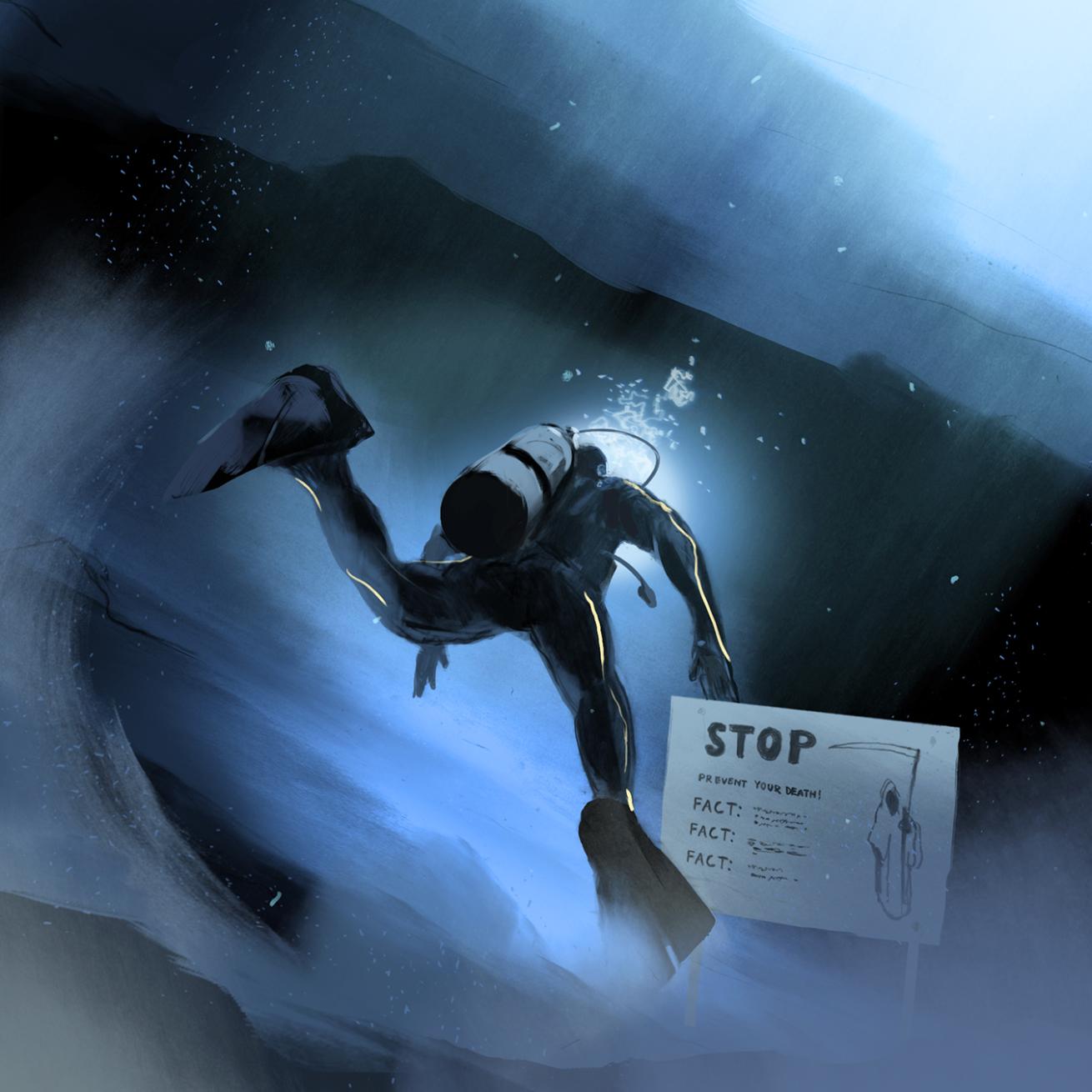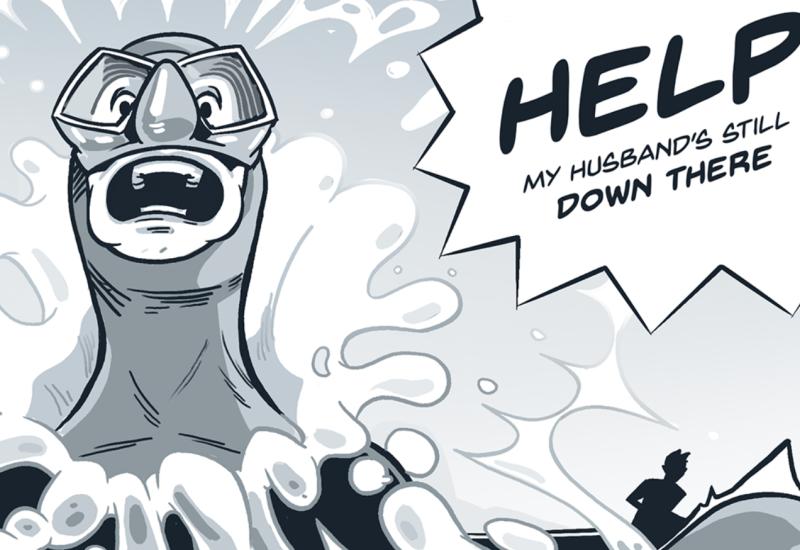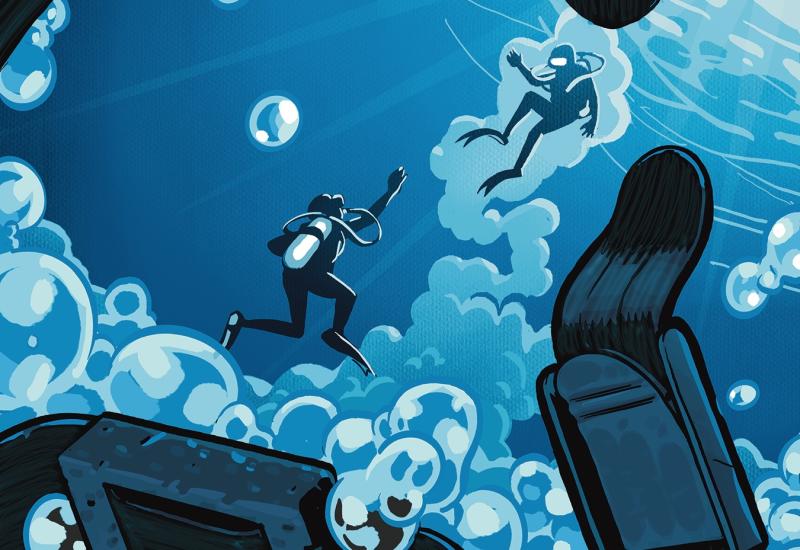Lessons for Life: Inexperienced Diver Drowns in Cave System

CRISIS IN A CAVE
Miko Maciaszek
Diving was diving, right? Rex was sure his experience diving on wrecks and reefs would carry him through. After all, it wasn’t the first time he had ventured inside of something with a roof over his head.
Rex decided to take a quick look into the cave system attached to the lake he was diving. It was dark, but he had a small light with him. He kept it in his BC pocket and had almost forgotten about it as he geared up. Rex thought the cave system was pretty cool — until he turned around and couldn’t see the way back out.
THE DIVER
Rex was 47 years old, with an advanced open water certifcation. He had a couple of specialty ratings, but no training diving in caverns, caves or overhead environments. He had logged a few hundred dives over 10 years; most of his experience came from boat dives in Florida and in the Caribbean.
THE DIVE
Rex met three friends at a nearby open-water dive site that local instructors used for training. It was a freshwater spring with a large lake divers could explore. The spring’s owners had installed platforms that divers used to perform skills, as well as hoops to practice buoyancy control.
Off to one side of the facility, the natural spring exited an underwater cave. There was a cavern where divers could swim around, keeping the lake directly behind them while experiencing the feeling of the rock face looming large in front of them and over their heads. Beyond that cavern area, divers with the proper training could enter an expansive cave system.
Before Rex and his buddies were allowed to dive in the lake, the site operators briefed the foursome and warned them to stay away from the cave, telling them that many divers had died by going inside without the proper preparation, training and equipment. Rex and his friends signed releases agreeing to take responsibility for their actions, and a statement acknowledging they had been warned not to go inside the cave system. They were told they weren’t allowed to take lights along on the dive, a final measure to keep inexperienced divers from going inside the cave.
THE ACCIDENT
After a couple of circuits around the open-water portion of the lake, Rex began to grow bored with the dive. There wasn’t much to see or do, and he wasn’t interested in practicing his buoyancy control swimming through the hoops or the manufactured swim-throughs. He started to get curious about the cave system and then remembered he had a small light in his BC pocket. While his friends were seeing how close they could get to a foating hoop without touching it, he decided to swim away and explore the cave. He told himself he would just go inside the opening to see what it was like. It couldn’t be very different from going into the pilot house of a shipwreck. He had a roof over his head when he did that too.
Rex ignored the warning sign positioned just outside the cave. It took some effort to get through the opening — the water flowing out of the underground spring pushed against him as he crawled through. Inside, Rex took a moment to let his eyes adjust while he shined the light around the cave’s first opening. There wasn’t much to see in that first room, but he knew the cave opened up just a little farther in. He had seen pictures in the dive shop. Rex finned even farther ahead, looking at the tunnels that ventured of to either side and shining his small light around to see what he could see. The water pressure from the spring dropped of significantly inside the cave, so Rex was able to swim more easily.
After a few more minutes, Rex realized his buddies were probably wondering where he was. He checked his air supply and realized it was getting low. He had been in the water about 40 minutes and had worked hard to get inside the cave. He turned to go out and realized he wasn’t sure where the opening to the surface was. He had kicked up quite a bit of the fine silt that covered the bottom of the cave, making the water hazy.
Rex became nervous, but he began swimming back the way he thought he had come, certain he would see the opening just around the next bend in the tunnel. He never found it.
When Rex’s buddies realized he was gone, they immediately began looking for Rex around the cave entrance. The water flowing out of the cave made it difficult for them to do more than peek their heads inside. They didn’t have lights with them, so they couldn’t see anything. They noticed quite a bit of silt coming out of the cave and decided they needed to get help.
They hoped they would find Rex on the surface, waiting for them. He wasn’t there. Rex’s body was recovered several days later.
ANALYSIS
There’s a saying that watching your air pressure go down to zero is no way to spend the rest of your life. Every year, divers learn this terrible lesson.
Rex made several mistakes, but none more ill-fated than simply letting his ego and curiosity take the place of good sense and sound decisions. He disregarded a warning sign that told him divers had died inside the cave he was about to enter, and he ignored the signs telling him he was not allowed to take a light into the water.
Diving inside a cave or just about any overhead environment requires training, practice, experience and specialized equipment. In a cave-diving course, Rex would have learned not to enter a cave system with only half a tank of air and other rules regarding breathing-gas management. He would have practiced laying a line into the cave using a reel so he could find his way back out. He also would have practiced finning techniques that would keep him from stirring up the silt on the bottom of the cave. He also would have learned that he needed to carry a primary light and at least one backup light, in case one failed. And, of course, he wouldn’t have gone into the cave in the first place without a buddy.
LESSONS FOR LIFE
1 Don't Go Do not enter a cave or other overhead environment without specialized training or equipment.
2 Understand Your Limitations Experience in one environment does not necessarily mean you can dive everywhere. If you’re diving somewhere new, make a guided dive to learn the local ropes.
3 Follow the Rules Rules such as not carrying lights into a lake attached to a cave system are there for your protection.
Eric Douglas co-authored the book Scuba Diving Safety, and has written a series of adventure novels, children’s books, and short stories — all with an ocean and scuba-diving theme. Check out his website at booksbyeric.com.
Learn from scuba diving accidents by visiting the Lessons For Life section of our website.
Diving was diving, right? Rex was sure his experience diving on wrecks and reefs would carry him through. After all, it wasn’t the first time he had ventured inside of something with a roof over his head.
Rex decided to take a quick look into the cave system attached to the lake he was diving. It was dark, but he had a small light with him. He kept it in his BC pocket and had almost forgotten about it as he geared up. Rex thought the cave system was pretty cool — until he turned around and couldn’t see the way back out.

Miko MaciaszekCRISIS IN A CAVE
THE DIVER
Rex was 47 years old, with an advanced open water certifcation. He had a couple of specialty ratings, but no training diving in caverns, caves or overhead environments. He had logged a few hundred dives over 10 years; most of his experience came from boat dives in Florida and in the Caribbean.
THE DIVE
Rex met three friends at a nearby open-water dive site that local instructors used for training. It was a freshwater spring with a large lake divers could explore. The spring’s owners had installed platforms that divers used to perform skills, as well as hoops to practice buoyancy control.
Off to one side of the facility, the natural spring exited an underwater cave. There was a cavern where divers could swim around, keeping the lake directly behind them while experiencing the feeling of the rock face looming large in front of them and over their heads. Beyond that cavern area, divers with the proper training could enter an expansive cave system.
Before Rex and his buddies were allowed to dive in the lake, the site operators briefed the foursome and warned them to stay away from the cave, telling them that many divers had died by going inside without the proper preparation, training and equipment. Rex and his friends signed releases agreeing to take responsibility for their actions, and a statement acknowledging they had been warned not to go inside the cave system. They were told they weren’t allowed to take lights along on the dive, a final measure to keep inexperienced divers from going inside the cave.
THE ACCIDENT
After a couple of circuits around the open-water portion of the lake, Rex began to grow bored with the dive. There wasn’t much to see or do, and he wasn’t interested in practicing his buoyancy control swimming through the hoops or the manufactured swim-throughs. He started to get curious about the cave system and then remembered he had a small light in his BC pocket. While his friends were seeing how close they could get to a foating hoop without touching it, he decided to swim away and explore the cave. He told himself he would just go inside the opening to see what it was like. It couldn’t be very different from going into the pilot house of a shipwreck. He had a roof over his head when he did that too.
Rex ignored the warning sign positioned just outside the cave. It took some effort to get through the opening — the water flowing out of the underground spring pushed against him as he crawled through. Inside, Rex took a moment to let his eyes adjust while he shined the light around the cave’s first opening. There wasn’t much to see in that first room, but he knew the cave opened up just a little farther in. He had seen pictures in the dive shop. Rex finned even farther ahead, looking at the tunnels that ventured of to either side and shining his small light around to see what he could see. The water pressure from the spring dropped of significantly inside the cave, so Rex was able to swim more easily.
After a few more minutes, Rex realized his buddies were probably wondering where he was. He checked his air supply and realized it was getting low. He had been in the water about 40 minutes and had worked hard to get inside the cave. He turned to go out and realized he wasn’t sure where the opening to the surface was. He had kicked up quite a bit of the fine silt that covered the bottom of the cave, making the water hazy.
Rex became nervous, but he began swimming back the way he thought he had come, certain he would see the opening just around the next bend in the tunnel. He never found it. When Rex’s buddies realized he was gone, they immediately began looking for Rex around the cave entrance. The water flowing out of the cave made it difficult for them to do more than peek their heads inside. They didn’t have lights with them, so they couldn’t see anything. They noticed quite a bit of silt coming out of the cave and decided they needed to get help.
They hoped they would find Rex on the surface, waiting for them. He wasn’t there. Rex’s body was recovered several days later.
ANALYSIS
There’s a saying that watching your air pressure go down to zero is no way to spend the rest of your life. Every year, divers learn this terrible lesson.
Rex made several mistakes, but none more ill-fated than simply letting his ego and curiosity take the place of good sense and sound decisions. He disregarded a warning sign that told him divers had died inside the cave he was about to enter, and he ignored the signs telling him he was not allowed to take a light into the water.
Diving inside a cave or just about any overhead environment requires training, practice, experience and specialized equipment. In a cave-diving course, Rex would have learned not to enter a cave system with only half a tank of air and other rules regarding breathing-gas management. He would have practiced laying a line into the cave using a reel so he could find his way back out. He also would have practiced finning techniques that would keep him from stirring up the silt on the bottom of the cave. He also would have learned that he needed to carry a primary light and at least one backup light, in case one failed. And, of course, he wouldn’t have gone into the cave in the first place without a buddy.
LESSONS FOR LIFE
1 Don't Go Do not enter a cave or other overhead environment without specialized training or equipment.
2 Understand Your Limitations Experience in one environment does not necessarily mean you can dive everywhere. If you’re diving somewhere new, make a guided dive to learn the local ropes.
3 Follow the Rules Rules such as not carrying lights into a lake attached to a cave system are there for your protection.
Eric Douglas co-authored the book Scuba Diving Safety, and has written a series of adventure novels, children’s books, and short stories — all with an ocean and scuba-diving theme. Check out his website at booksbyeric.com.
Learn from scuba diving accidents by visiting the Lessons For Life section of our website.










